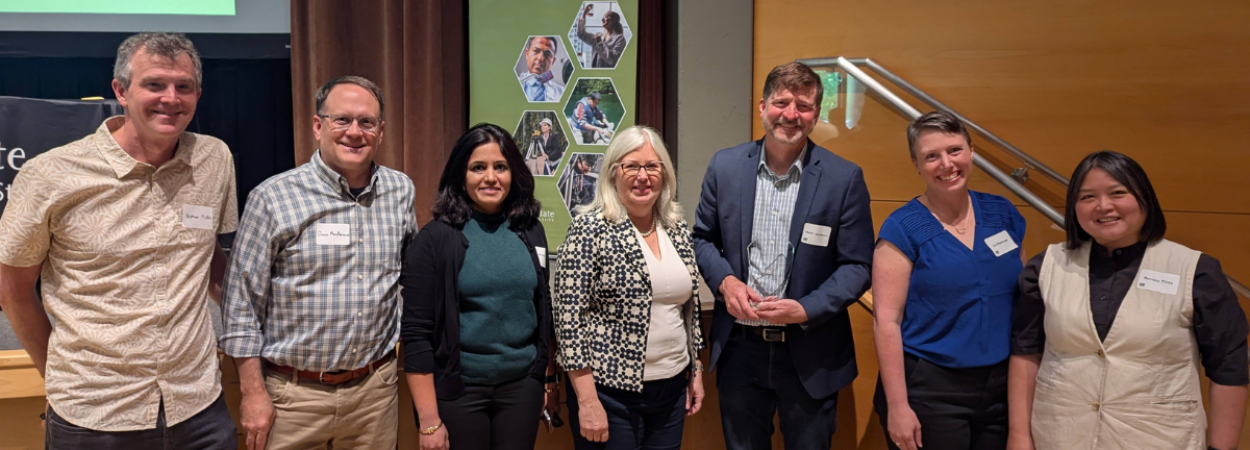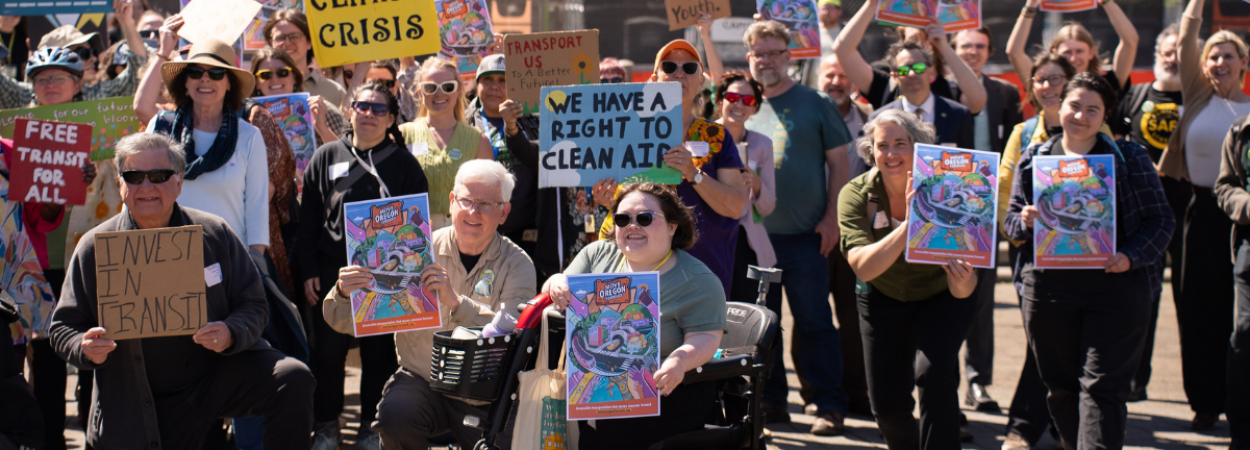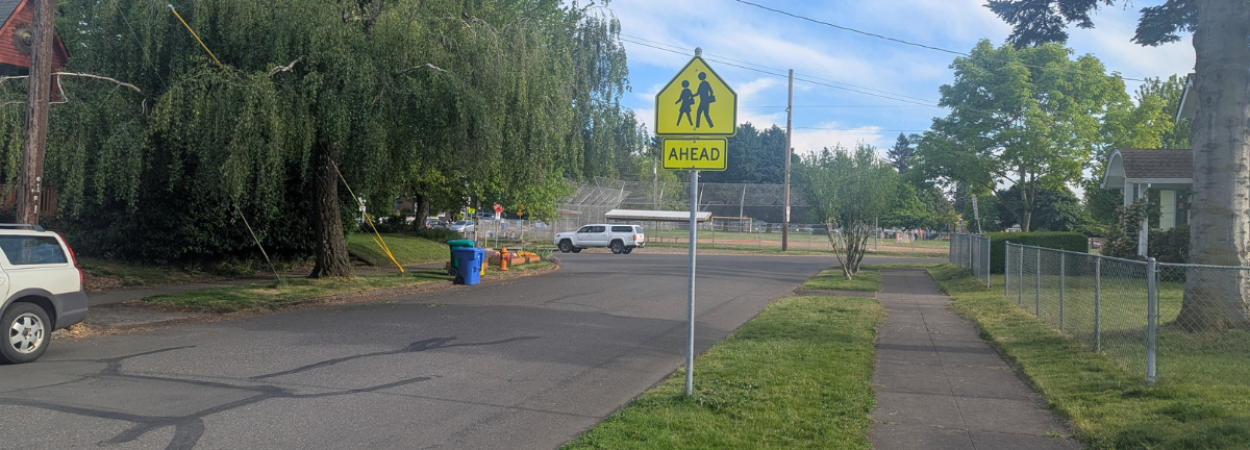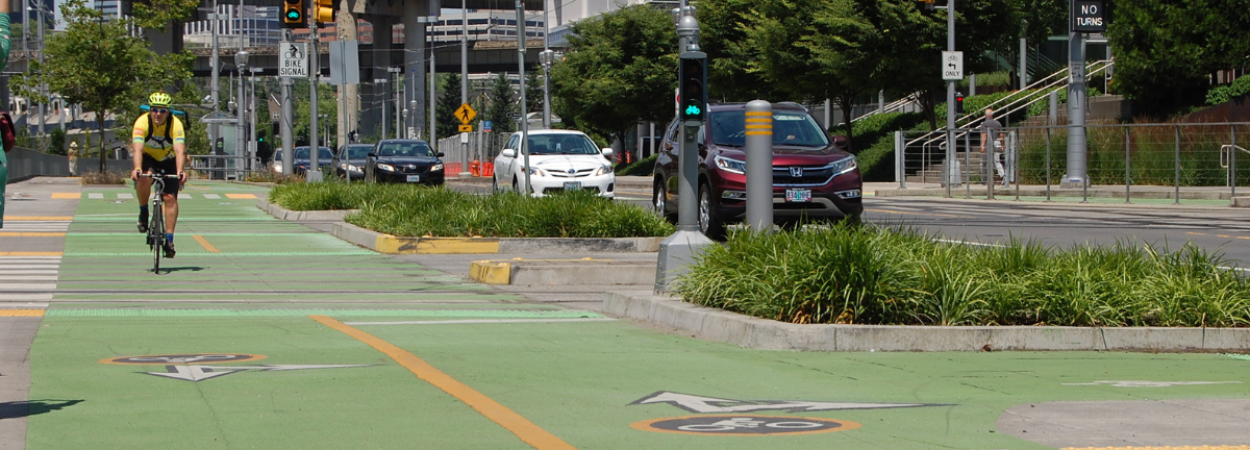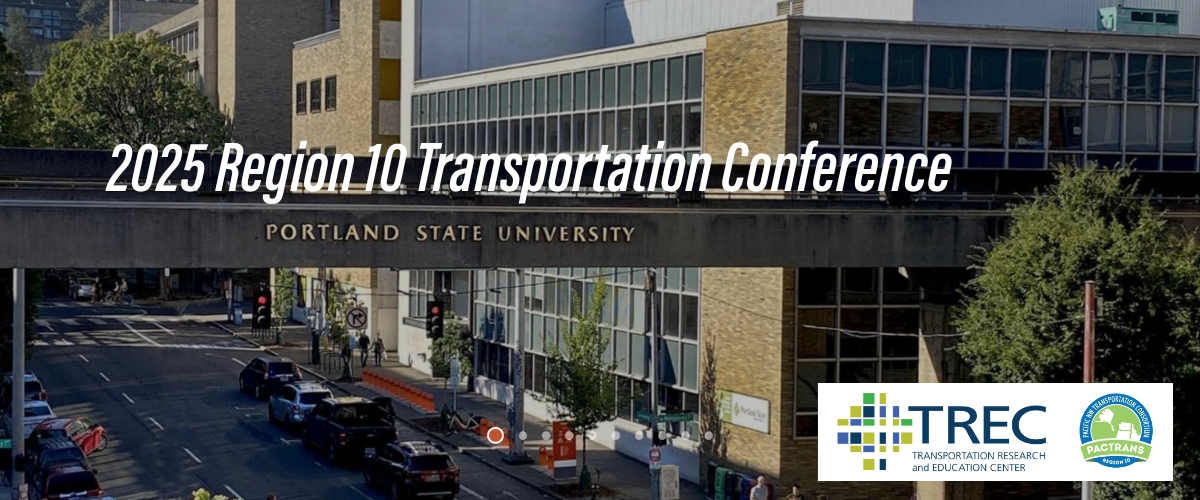Last week, Portland State University (PSU) recognized the Portland Bureau of Transportation (PBOT) with its inaugural Public Impact Partner Award, celebrating the power of research to drive transformative change in the community.
The award was accepted by PBOT’s Deputy Director of Planning, Projects and Programs, Art Pearce, at an awards ceremony at PSU on Friday, May 9 in recognition of the agency's commitment to ensuring that Portland's transportation network is designed and maintained using evidence-driven practices. And the partnership continues: A new intergovernmental agreement (IGA) between PSU and PBOT was just signed in May 2025, which will support projects that foster innovation and meet Portland's goals of a livable, equitable and sustainable city.
By basing its plans, policies, and infrastructure designs on data and research findings, PBOT works to enhance safety and mobility for people walking, rolling, bicycling, riding transit, and driving in Portland. A long history of research partnership between PSU and PBOT means that people traveling in this city are using some of the nation's most innovative, multimodal transportation infrastructure.
Peter Koonce, PBOT's Division Manager for Signals, Street Lighting, ITS, & Electrical Maintenance, has worked on a number of research projects with PSU. He values the university-city partnership for several reasons, from introducing students to the transportation profession to addressing problems with on-the-ground research.
"What seem like mundane things really do impact the day-to-day lives of people in Portland and beyond. If you think about something as simple as rolling up to a traffic signal: Does the person know the signal has detected them? What happens when you push the pedestrian button? From the basic level, we can carve out questions that we can send to PSU and get answers to, so that we get an in-depth understanding of how users are interacting with and responding to the infrastructure," Koonce said.
WHY WAS PBOT CHOSEN FOR THE AWARD?
PBOT is being recognized for its demonstrated track record of active engagement with research at Portland State. The agency's collaborations with PSU's Transportation Research and Education Center (TREC) over the years have led to real improvements in the Portland area as well as on the national level. Additionally, dozens of PSU students have benefited from involvement in these research projects through hands-on learning, paid research experience, internships, and employment opportunities after graduation.
Since 2008, PBOT has contributed roughly $1.7 million in in-kind support for 18 research projects through PSU’s federally funded transportation centers, headquartered at TREC. Additionally, PBOT has provided more than $550,000 in direct funding for PSU-led research between 2002 and May 2024.
WHAT ARE SOME IMPACTS OF THE PBOT/PSU PARTNERSHIP?
Dylan Rivera, PBOT's Public Information Officer, says the university partnership empowers PBOT to innovate.
"A lot of what PBOT is doing is different from what other city and state transportation departments are doing. Often we find ourselves at the cutting edge of new designs. When we're designing for safety instead of speed; bicycle and pedestrian traffic and not just vehicle traffic; it's going against half a century of inertia and longtime practices. So we need research to inform us," Rivera said.
Over time, incremental changes can lead to striking results.
"The long-term relationship really matters. It's like a LEGO structure: You just keep building additional blocks and then at some point you have this amazing display. It's really quite impressive when you think about the history of participation. The research is not always that one "aha" moment. It's building knowledge over time," Koonce said.
PBOT frequently turns to PSU with real-world transportation challenges that spark collaborative research. Below are just a few examples.
GREEN BIKE BOXES
After two tragic right-hook crashes involving cyclists in 2008, PBOT proposed green bike boxes as a potential solution—though these markings weren’t yet approved federally. To move the idea forward, PBOT submitted a request to experiment to the Federal Highway Administration, with PSU evaluating the results. This eventually contributed to green bike boxes being codified in the now-current edition of the federal Manual on Uniform Traffic Control Devices (MUTCD).
Building on the initial bike box study, a 2021 masters thesis by a PSU civil engineering student looked into extending those boxes through the intersection via green-painted bike crosswalks, or "crossbikes."
THE TRANSPORTATION WALLET
PBOT launched the Transportation Wallet for Residents of Affordable Housing Pilot in 2019, providing low-income Portland residents with funds and discounts on public transit and other transportation services. PSU helped PBOT to evaluate the program, with results showing that participants tried traveling via new modes, were able to travel more than they would have otherwise, and felt less stressed about transportation costs. Since the pilot, PBOT has expanded work on the Transportation Wallet program.
BICYCLE DETECTION AND FEEDBACK ASSESSMENT
PBOT also collaborated with the Oregon Department of Transportation (ODOT) to fund research on bicycle detection confirmation devices, which let cyclists know that the traffic signal has recognized their presence. The research conducted by PSU evaluated blue light detection feedback systems and the first installation of a bicycle countdown timer in the U.S., and provided recommendations for practitioners across the country for the installation of these innovative devices.
PROTECTED BIKE LANES: LESSONS FROM THE GREEN LANES
PBOT was a partner in the first national study evaluating protected bike lanes in the U.S., led by PSU. Protected bike lanes, also known as cycle tracks, are on-street bike lanes physically separated from motor vehicle traffic by barriers such as curbs, planters, parked cars, or posts. The study provided clear evidence that protected bike lanes enhance riders' sense of safety, and that both drivers and pedestrians also support the creation of more such lanes to separate bicycles from motor traffic. The findings of this report have been adopted by numerous public agencies in their planning efforts.
BIKE BOULEVARDS
Bicycle boulevards, also known as neighborhood greenways, have been part of the City’s bicycle network since the 1990s. However, they are not common in the U.S. and there has been limited evidence of their effects on ridership. PBOT has supported PSU research projects with cash and in-kind support that have collected both survey and GPS data used to assess the effects of this infrastructure. Those studies helped demonstrate the benefits of bike boulevards, including the potential to reduce the gender gap in cycling.
OPPORTUNITIES FOR PSU STUDENTS
Beyond the practical outcomes of the research, the partnership benefits both PSU and PBOT by allowing PSU students to develop their skills, trying new ideas and gaining hands-on experience. Students studying civil engineering and urban planning have developed plans and designs for the city through engineering capstone projects, Master of Urban and Regional Planning (MURP) workshop projects, and the Better Block PSU program.
"It is truly a two-way street. We're helping to introduce new people to the wonders of transportation through being involved in the ground-level research. As a young researcher myself, thirty years ago, I had an internship studying transit signal priority in Portland. The city gave me that opportunity so it's really just a way to give back, introduce people into the profession, and try to attract smart minds to help solve the transportation problems that we have today. Over half of my staff engineers are from the PSU program," Koonce said.
WHY HIGHLIGHT PUBLIC IMPACT RESEARCH?
Being an urban-serving research institution is a key part of PSU's identity – hence the motto, "Let Knowledge Serve The City," meaning that the outcomes of higher education should directly benefit the community to which the university belongs.
In recognition of this identity and commitment, PSU's Research and Graduate Studies (RGS) department announced two additions to its annual Research Awards this year: The Public Impact Partner Award and the Faculty Award for Public Impact Research. This year's Faculty Award for Public Impact Research was awarded to Mechanical and Materials Engineering professor Elliott Gall.
Learn more about PSU's annual research awards and meet the 2025 winners here.
Portland State University's Transportation Research and Education Center (TREC) is a multidisciplinary hub for all things transportation. We are home to the Initiative for Bicycle and Pedestrian Innovation (IBPI), the data programs PORTAL and BikePed Portal, the Better Block PSU program, and PSU's membership in PacTrans, the Pacific Northwest Transportation Consortium. Our continuing goal is to produce impactful research and tools for transportation decision makers, expand the diversity and capacity of the workforce, and engage students and professionals through education, seminars, and participation in research. To get updates about what's happening at TREC, sign up for our monthly newsletter or follow us on social media.


